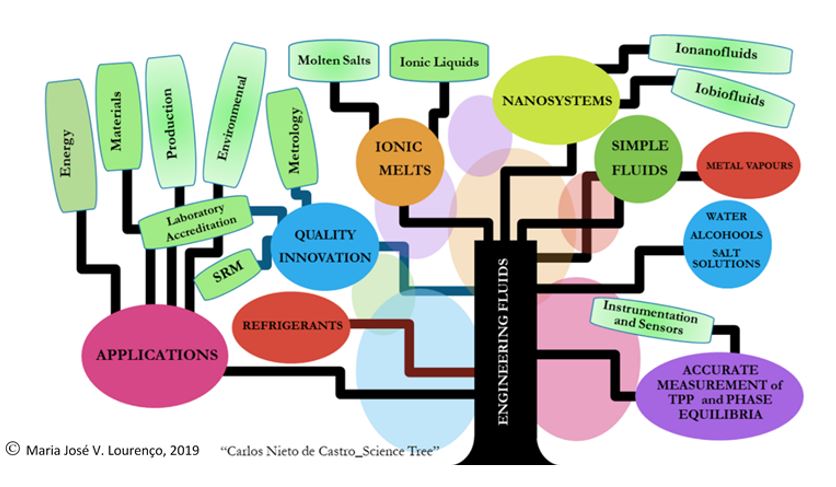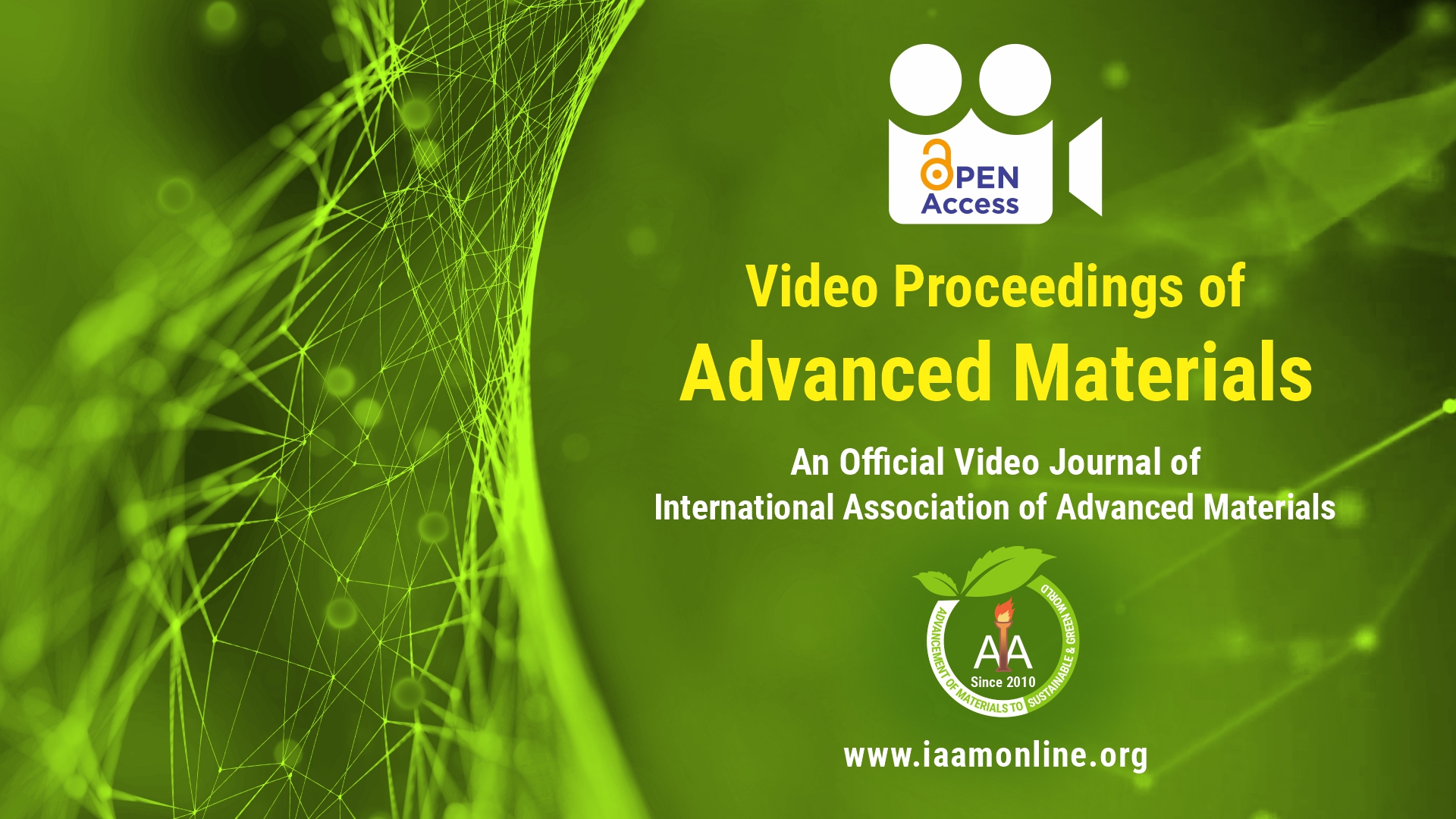Video Article Open Access
Thermophysical Properties of Fluids and Materials for Energy Applications. From Macro to Nano World
Carlos A. Nieto de Castro1,*, Maria José V. Lourenço1, Fernando J. V. Santos1, Manuel Matos Lopes1, Valentim M. B. Nunes1,2
1Centro de Química Estrutural, Institute of Molecular Sciences, Departamento de Química e Bioquímica, Faculdade de Ciências, Universidade de Lisboa, Campo Grande, 1749-016, Lisboa, Portugal
2Centro de Investigação em Cidades Inteligentes, Instituto Politécnico de Tomar, Campus da Quinta do Contador, 2300-313, Tomar, Portugal
Vid. Proc. Adv. Mater., Volume 3, Article ID 2206302 (2022)
DOI: 10.5185/vpoam.2022.06302
Publication Date (Web): 24 Sep 2022
Copyright © IAAM
Graphical Abstract

Abstract
Thermophysics is the science and technology of the most important properties of materials. Thermophysical properties are all material properties affecting the transfer and storage of heat, that vary with the state variables temperature, pressure and composition, without altering the material's chemical identity. Thermophysical properties play an important role in several processes in the chemical, extraction and manufacturing industries, especially in those involving simultaneous heat and mass transfer. Most of the problems that affect our society need values of these properties to design and characterize new products and processes, to replace unacceptable processes and compounds and to optimize energy balances and efficiency1. To make good measurements of thermophysical properties, namely for high temperature applications2, is difficult and time consuming and it is not fashionable not economically attractive for industries and funding agencies. The need for accurate data on thermophysical properties of fluids has been replaced to a certain extent by alternative methods of properties calculation, mostly based on computer simulation or prediction/estimation methodologies (cheaper, but risky). The Molecular Thermophysics and Fluid Technology Group of Centro de Química Estrutural is an international recognized group in Thermophysics of Fluids and Materials, with a strong experience on experimental measurement, modelling and correlation of thermophysical properties, designing equipment’s and sensors for fundamental and industrial applications. In the recent years most of this research was directed to cutting-edge research, which include ionic liquids, molten salts, nanomaterials and IoNanofluids and new engineering fluids. One of the main advantages of our know-how is the possibility of implement the cross fertilization of these research fields to resolve delicate problems, not only at a molecular level, but also in the possible industrial applications. Some examples of this research, patented when applicable, are: New spectrally selective coatings for solar paints; Development of new nano-based heat transfer fluids, making a solar collector and heat exchangers more energy efficient obeying to the environmental goals set by the World Energy Council3,4. Measuring viscosity of new molten salts and alloys for high-tech applications; Measuring thermal conductivity of humid air for high pressure turbines; Developing metal-film sensors for high temperature in situ measurements in incinerators. Science is fundamental to support technology developments, namely in the area of nanosystems, namely using nanomaterials (CNT’s, graphene, natural melanin) to enhance the thermal properties of base engineering fluids, which have to be measured by rigorous instrumental methods. In addition, the environmental and safety requirements on the use of nanomaterials and nanosystems require the development of a strategy for their production, use and disposal. The implementation of a regulatory framework, a driving force for nanotechnologies development is essential to its acceptance by society. A strategy to select a given nanofluid or IoNanofluid for a given application, bound by the environmental and safety regulatory frameworks was recently proposed5. This lecture will focus on the relevant points mentioned, illustrating our work, challenges, difficulties, successes and fails.
Keywords
Thermophysical properties; ionic melts; nanomaterials; nanosystems; sustainability.
Acknowledgement
The authors would like to thank Fundação para a Ciência e Tecnologia, Portugal, for partial financing through projects UIDB/00100/2020 e UIDP/00100/2020 to Centro de Química Estrutural and LA/P/0056/2020 to Institute of Molecular Sciences, as well by previous research projects in the last 20 years. Authors also would like to thank our co-author Maria José V. Lourenço for the design of the graphical abstract.
References
- C.A. Nieto de Castro. Challenges for European science and technology – thermosphysics of fluids and nanosystems. Open Access Government, 2017, November, pp 218-219.
- https://www.openaccessgovernment.org/open-access-government-november-2017/39524/ .(Accessed May 4, 2022)
- C.A. Nieto de Castro, M.J.V. Lourenço. Towards the Correct Measurement of Thermal Conductivity of Ionic Melts and Nanofluids”, Energies, 2020, 13 (1), 99(22).
- K. Massonne, S. Vieira, M.J. Lourenço, C. Nieto de Castro. Use of Melanin or Melanin Particles for Solar Thermal Energy Conversion. Patent Number EP 3 228 192 A2, 11 October 2017.
- F.E.B. Bioucas, S.I.C. Vieira, M.J.V. Lourenço, F.J.V. Santos, C. A. Nieto de Castro, “Performance of heat transfer fluids with nanographene in a pilot solar collector”, Solar Energy, 2018, 172, 171-176.
- Maria José Lourenço, João Alexandre, Charlotte Huisman, Xavier Paredes, Carlos Nieto de Castro, “The balance between energy, environmental security, and technical performance: the regulatory challenge of nanofluids”, Special Issue on Colloids and Nanofluids for Energy Management, Nanomaterials, 2021, 11(8), 1871(22). Selected as a Featured Paper.
Biography
Carlos A. Nieto de Castro was born in Portugal in 1949. Full Professor at the Faculty of Sciences of the University of Lisbon since 1980, jubilated in 2019. Studied Chemical Engineering and obtained his PhD in Engineering Sciences (Chemical Thermodynamics) from Instituto Superior Técnico, Portugal (1977). Received the Portuguese Stimulus to Excellence in Research Award, FCT-MCTES, Portugal (2005), the University of Lisbon Medal for distinguished service and has about 400 scientific publications including 38 books and chapters, one European patent and 550 conference presentations. He directed over 40 national and international funded projects, part of them involving industrial companies. Member of several international scientific boards and learning societies, he is an international evaluator under European, National, and International programs, associate editor of the Journal of Chemical and Engineering Data (ACS), editorial board member of several journals, and IUPAC fellow. Prof. Carlos Nieto de Castro is one of world's most cited top scientists in Chemical Engineering/Physical Chemistry (top 2%), Stanford University Ranking, US, 2020, 2021. With more than 45 years dedicated to the research in thermodynamics and transport processes of fluids and materials, his actual scientific activity covers the field of molecular thermophysics and fluid technology, ionic liquids, molten salts, nanofluids, ionanofluids and nanosystems, including new heat and storage fluids with industrial impact in the areas of energy and environment, and the use of ionic liquids as solvating and reaction media to synthesize and functionalize nanomaterials, for industrial and domestic applications.
Video Proceedings of Advanced Materials

Upcoming Congress



